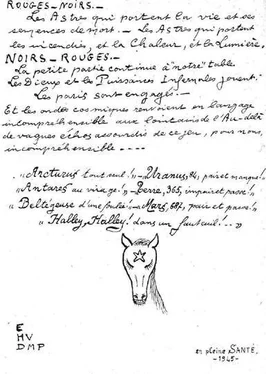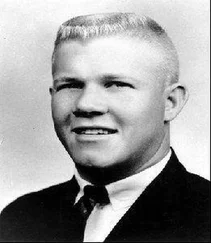“I refuse to tell you,” Petiot said. “I did not work to earn a stripe or a decoration. When there are invaders, there are always avengers.”
Véron persisted in his demands.
“I do not have to explain murders that I am not accused of committing. When I have been acquitted, you can indict me for the thirty Boches that I have taken down,” Petiot said, his usual bluster likely strengthened by his belief that the trial was swinging in his favor. Actually, several reporters in the room agreed with him. Headlines the next day noted that Petiot’s conviction looked doubtful.
Véron asked Petiot about his relationship to the Gestapo. Why did they not react to his so-called killings of German soldiers, and more important, once they had arrested him, why did they release him from prison? This was an important question that deserved more attention. Civilians arrested for helping evaders could expect no mercy from the Gestapo.
“Obviously,” Yonnet said, “this man should have been shot.”
“Monsieur Ibarne,” Petiot said, using Yonnet’s Resistance alias, “I saw you somewhere that you would not like me to mention.”
“On the contrary, I demand that you say it, because I am sure that I have never seen you.”
Petiot, who did not say a word, sat there beaming with a smirk that suggested that he held some valuable inside knowledge. Yonnet demanded that he answer.
“Do you not play tennis at the Racing Club?” Petiot asked, suggesting that Yonnet was affiliated with an institution requisitioned by the Germans and favored by many elite French collaborators. No, Yonnet said, he did not play tennis and had never been to that club. Petiot made no rebuttal.
Yonnet’s DGER colleague, Lieutenant Brouard, next testified that Petiot could not pick out Cumuleau in a group of photographs. Moreover, he reiterated the results of their investigation, which included no fewer than twenty-five instances where Petiot’s testimony contradicted basic facts about the Resistance. By the time Leser adjourned the court at seven that evening, these last two prosecution witnesses had dealt harsh blows to Petiot’s credibility.
32.
THE HAIRDRESSER, THE MAKEUP ARTIST, AND THE ADVENTURESS
PEOPLE WANT TO PORTRAY ME AS A PROCURER, PEOPLE WANT TO PORTRAY ME AS AN ACCOMPLICE; WORSE, THEY WANT TO PORTRAY ME AS AN AGENT OF THE GESTAPO. THEY’VE CALLED ME A LOOSE WOMAN. I’VE BEEN CALLED EVERYTHING. THEY’VE RUINED ME, AND NOW THEY WANT TO DESTROY ME.
—Eryane Kahan
THE ninth day of the trial, March 27, the prosecution called Petiot’s alleged accomplices to the stand, including the hairdresser Raoul Fourrier, the makeup artist Edmond Pintard, Marcel’s brother Maurice, and his old friend René Nézondet. The witnesses certainly had a wealth of relevant information, but the challenge for both prosecution and defense was ferreting it out and making sense of testimony that often obscured more than it revealed.
When a guarded and taciturn Fourrier took the stand, Président Leser returned to the question of his motives for bringing clients to Petiot. Fourrier would not admit to anything other than that he had helped what he believed was a patriotic organization. His confidence in the integrity of the group was confirmed, he said, when the Gestapo arrested Petiot and held him in prison for almost eight months.
Asked about the disappearance of the gangsters and their mistresses, Fourrier said that he did not know that the men would bring the women with them. No, he had not asked many questions, because Petiot told him that the matter was confidential. He emphasized how little he in fact knew of the organization and that it was actually his colleague, Edmond Pintard, who went looking for travelers.
Pintard admitted scouring the bars and cafés of Montmartre for potential clients, generally soliciting by speaking “neither of business nor politics, but of everything and nothing.” He confessed to recruiting all nine of the gangsters and their girlfriends. Like Fourrier, he seemed to believe that he was only helping people escape Nazi oppression.
At one point, Pintard testified that Fourrier showed him a letter or note from Jo the Boxer confirming his arrival in Buenos Aires. Petiot smirked and then, almost off the cuff, admitted that he had imitated Jo’s handwriting and forged the note. This was a surprising confession, coming out, as it did, after the handwriting expert had concluded that other similar surviving letters were genuine. Petiot was apparently enjoying the sensation of showing up an authority, even one whose testimony might be said to work in his favor.
Marcel Petiot’s oldest friend, René Nézondet, took the stand. His testimony—if not much more enlightening—was more damaging to the defendant. Just as he had told the Gestapo following his arrest with Petiot in May 1943, Nézondet said that he did not know anything at that time about Petiot’s activities. It was in prison, he said, that he learned that the physician conducted “clandestine passages” and expected the Germans to shoot him. It was after his own release from prison, Nézondet said, that he learned what Petiot was really doing to his clients.
The realization had come in a conversation with Maurice Petiot. “The journeys begin and end at rue Le Sueur,” Petiot had allegedly told him, before describing the “many suitcases, postdated letters, syringes, a formula for poison, and some bodies” that he found on the property. When Nézondet expressed his shock, calling the doctor a “monster,” the younger Petiot had defended his brother as “a sick man” who needed treatment and insisted that Nézondet keep quiet about the information. Otherwise, he said, everyone would be shot.
Nézondet’s date for this conversation with Maurice, July 1943, differed from the time of December 1943 that he had indicated to the police. Still, this was the most harmful testimony to Petiot that day, coming from a source close to the defendant. At the same time, Nézondet related how Maurice told him about finding several German uniforms at rue Le Sueur, though the question remained open whether this would ultimately help or hurt Petiot. Would this testimony, for instance, support his claim that he posed as a German policeman to arrest traitors, or did it perhaps indicate that the defendant had much closer ties to the Nazis than hitherto revealed?
When Maurice Petiot took the stand, he flat-out denied Nézondet’s statements. He spoke softly and with considerable difficulty; he was then suffering from the late stages of throat cancer. Petiot admitted seeing German uniforms at his brother’s property, but, he emphasized, he had never seen any bodies, poisons, syringes, or, in fact, anything disturbing. Certainly, he never said those things Nézondet claimed. Nézondet was simply carried away by his imagination.
Maître Charles Henry, the attorney representing the family of Paulette Grippay, asked the witness about the uniforms. “Were you not surprised to find all those clothes, particularly the German uniforms, as you stated?”
“No, I concluded that my brother had killed soldiers of the Wehrmacht.”
“And what conclusion did you draw from the presence of the civilian clothes?”
“None.”
Maurice Petiot would not, under any circumstances, provide testimony to hurt his brother, even if it came to the detriment of his own credibility. He admitted to delivering the lime to rue Le Sueur, as Marcel had asked, but maintained that the purpose was to whitewash the façade. He also admitted moving the suitcases to Courson-les-Carrières, claiming that he did not want them to fall into the hands of the Germans. Their origins and contents, he added, were never revealed to him. Maurice’s loyalty to his brother was clear. As he left the stand, he was observed giving a quick smile to Marcel. The defendant looked down, or away.
Читать дальше












